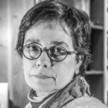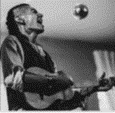Translated from the Spanish by Ikaro Valderrama Ortiz
Kenia Cano
 Born in Mexico City in 1972, Kenia Cano now lives in Cuernavaca. Some of her poetry books are Prayer of birds, The birds of this day (Carlos Pellicer Ibero-American Poetry Prize); An animal for the eyes and Diary of uncomfortable poems, the latter published by the Editorial Fund of the Autonomous University of Querétaro in 2017. Her poetry is part of several national anthologies. Her poems have been translated into French, English and Romanian. She teaches poetry and workshops about correspondences between poetry and the visual arts. She has been a SNCA fellow. She participates in national and international poetry festivals, offering workshops and public readings. She practices yoga and human figure drawing.
Born in Mexico City in 1972, Kenia Cano now lives in Cuernavaca. Some of her poetry books are Prayer of birds, The birds of this day (Carlos Pellicer Ibero-American Poetry Prize); An animal for the eyes and Diary of uncomfortable poems, the latter published by the Editorial Fund of the Autonomous University of Querétaro in 2017. Her poetry is part of several national anthologies. Her poems have been translated into French, English and Romanian. She teaches poetry and workshops about correspondences between poetry and the visual arts. She has been a SNCA fellow. She participates in national and international poetry festivals, offering workshops and public readings. She practices yoga and human figure drawing.
The following poems are part of the unpublished book: Domestic Architecture (Prosthesis and a reading by Louise), based on the reading of the work of Louise Bourgeois.
Kenia Cano: Metaphorical Cannibalism – Francia Elena Goenaga
Kenia Cano titles this unpublished work with a subtle oxymoron: the erasure of the Architecture of the great, in front of an architecture of the domestic; he opposes the majesty of the great work (perhaps, from the outside) against the armor of the house.
Her poetry is a “gluttonous text” that “swallows laughter”, it is a cannibalistic poetry that gives space to the void, to the encounter with the mystery. The poetic image gains more and more with the plasticity of the word, necessary to name the body, to create it anew.
House of the senses,
whole body,
split body.
Arrow from the mouth and intestine. (Kenia Cano, “Prosthesis”).
The body is the house of the senses, but it is also the extension of something, or the illusion that dresses us. Perhaps we wonder with Kenya Cano, if poetry is also a prosthesis of the language with which we invent a world to explain that other domestic that lives in us. Perhaps the answer lies in Louise, who upon healing she left open that door through which the Mexican poet enters and lets us look (in italics). Curiously, here, we can create a bridge with Frida Kahlo, and also visit the Colombian poet María Gómez Lara, another artist who makes an armor of her body and like an antiquijote goes out into the world without seeing windmills or giants, she only sees words that take up space in your brain.
Prosthesis 1
Lower back.
(The time she needed air around.)
About to kiss Romeo you fell,
Was there a ladder?
I rehearse how to kiss an ugly man.
UGLINESS.
Left shoulder blade.
(You recognize it?)
The not side of everything,
the organ floating just like that.
What if the whole truth resides in the body?
Why are they showing us so many corpses?
LIVE BODY
HIGH PALATE
TEETH
Writing from the right grindstone.
(Which loosens the osteopath.)
The experience of the body when it is.
__
Prosthesis 2
House of the senses,
whole body,
split body.
Arrow from the mouth and intestine.
(Digitopuncture.)
My surgeon niece.
Bastion (Fortress) Do you remember when we read the endless story?
The body is a valve,
VALVA
VULVA
TRUTHFUL SLIME
Galaxy.
Only from here can I read the world.
Fear under the arms.
The extreme tension, Louise, in a picture.
GESTURES OF THE LATINAMERICAN POETRY is a selection of Latin-American authors published as part of the transmedia digital project Gestos de la Poesía, held by the Cultural Center of the Universidad de los Andes, Bogotá, Colombia, since 2020.
Editorial Committee of Gestos de la Poesía in Bogotá: Ximena Guerrero (Head of the Cultural Center, Universidad de los Andes), Francia Elena Goenaga (Poet and professor of literature at the Universidad de los Andes) and Íkaro Valderrama (Colombian poet and singer-songwriter)
Website: https://live.eventtia.com/es/gestosdelapoesia/Gestos-2020



























0 Comments